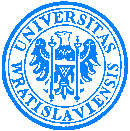| |
 |
UNIVERSITY
OF WROCŁAW
|
|
 |
| |
 |
WROCŁAW UNIVERSITY
OF SCIENCE AND
TECHNOLOGY
|
EDITING FORMULAS IN THE PMS TEMPLATE
- The sizes of parentheses, brackets and braces should generally
correspond to the sizes of relevant operators (sums, integrals, etc.);
they could be larger if followed by a division "slash".
- Avoid fractions; whenever possible replace them by a "slash" or a
negative power.
- The summation and integration limits should appear as subscripts and
superscripts in the text, in fractions, and in \cases. In other
situations they should appear below and above the operator us the
command, say, \int\limits_0^\infty.
- Use abbreviated notation for often repeated, complicated
expressions.
- Do not insert additional spacings before and after operators of
summation, integrations, etc.
- If possible, avoid splitting formulas into several lines. If such a
split is necessary then enforce it at relation signs or operators and put those signs at the begining of the next line. In
general, it is better if the first line of the multiline formula is
shorter than the other lines.
- Use bold face fonts to denote vectors.
- Do not use italics to denote operators, define them. Example: use
\operatorname*{Cov} for the covariance function.
- Use spacing between formulas according to the format:
- formula \qquad formula
- formula \qquad with \quad formula
- formula \qquad and \qquad formula
- Introduce only necessary numbering of the formulas, tag them and
refer to them via the command
\eqref{tag}. No parentheses are needed.
- Utilize built-in environments: theorem, lemma, proposition, remark,
corollary,
fact, commentary. In the environments remark, and definition we
only enter in italics the notion to be defined. In brackets additional
information can be entered (such as the name of the example, or the
authors of a theorem).
|
|